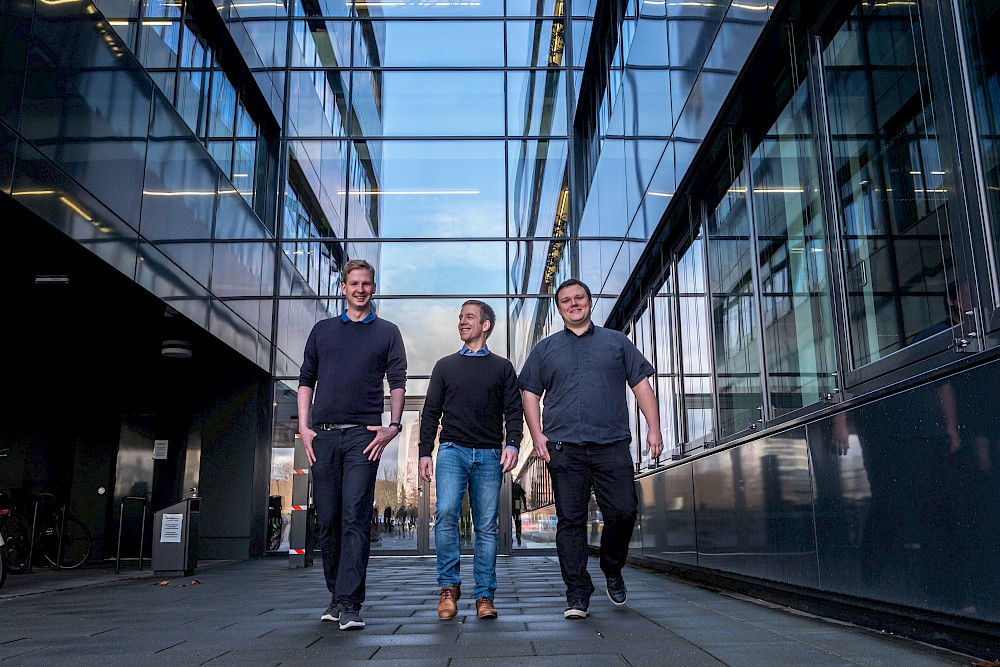Enzyme adhesive for combating cancer

Physicians began using drugs to fight cancer around 70 years ago. Chemotherapy treatment involves the use of substances known as cytostatics. Even though they do not directly detect the tumour, they do react to a particular property of cancer cells: an ability to divide quickly. However, targeting this marker has one crucial disadvantage in that healthy cells that divide quickly are also attacked. This is why the dosage of chemotherapy drugs cannot be increased arbitrarily. At the same time, the drugs often cause severe side effects that, in turn, need to be treated.
Cancer research is therefore intensively searching for therapies which transport the toxins directly to the tumour rather than disseminating them throughout the body. One promising approach has been around for a few years: antibody-drug conjugates. ADCs are based on artificially produced proteins that are programmed to attach to antigens of certain types of cancer and only dock onto these cells. The antibodies act as couriers - they are loaded with drugs, carrying them on “piggyback” so to speak, and release them at the target site where they can be most effective.
Multiple weapons
However, current ADC therapies that have been approved or are undergoing testing do have their limitations: “The sticking point is the conjugation, i.e. the linking of the antibodies to the respective toxins,” says René Wartner. “Current strategies rely on a reaction between naturally occurring groups of substances. This greatly limits the range of possible combinations.” For around five years, Wartner has been working with Andreas Simon and Marcus Böhme at the Institute for Biochemistry and Biotechnology on a method that makes loading toxins onto proteins easier and helps to exploit the full potential of ADCs.
Now the three PhD students from the Natural Products Biochemistry Research Group, led by Professor Frank Bordusa, have taken an important step towards a new generation of ADCs. At the heart of their molecular technology, which they have named TrypCo, is an enzyme that functions as a biochemical adhesive. This adhesive ensures that active ingredients can dock at precisely defined points on the antibody - under mild reaction conditions, i.e. without catalysts or special excipients. Thanks to TrypCo, the antibodies can be loaded with two or three different toxins instead of just one. This makes ADC much more effective if the tumour cells develop a resistance to certain toxins. “We want to reach the cancer with pinpoint accuracy and then defeat it with several weapons at once,” explains René Wartner.
Spin-off company planned
In the future, Wartner, Simon and Böhme will market their TrypCo technology through their own company. They have already filed two patents for their technology. The three researchers met as biochemistry students at MLU and they plan to base their joint start-up in Halle. In about two years’ time, they hope to support pharmaceutical companies in developing more effective and more tolerable drugs for treating cancer. “We are already in the process of establishing cooperation projects in which we combine our technology with innovations developed by other partners,” says René Wartner. In order to continuously improve their method, the business partners will remain in contact with researchers at the university once their spin-off is up and running.
Until then, they are working hard to prepare for self-employment while continuing to conduct their research work. The three founders will receive support from the state. “We applied for the ego.-Gründungstransfer program and were awarded the grant, which of course we are very happy about,” says Wartner. Saxony-Anhalt is supporting innovative start-up projects at universities through the Ego Programme using money from the European Regional Development Fund (ERDF). Wartner, Simon and Böhme will each receive 75,000 euros, which they can use to cover personnel expenses as well as material and operating costs. This support has enabled them to hire a business economist to survey the market and put the start-up on a solid economic footing.
MLU’s Transfer and Entrepreneurship Office also offers support in many aspects of business planning. For more than a year now, doctoral students have been receiving advice and information on available funding, how to submit successful applications, which workshops they can attend and how they can get in touch with mentors, sponsors and companies. Says Wartner, “It offers intensive support and the experts are highly committed. This enables us to continue to focus on our scientific work while preparing for the spin-off.”
René Wartner, Andreas Simon, Marcus Böhme
Institute of Biochemistry and Biotechnology
Tel. +49 345 55-24902
Mail: rene.wartner@biochemtech.uni-halle.de
